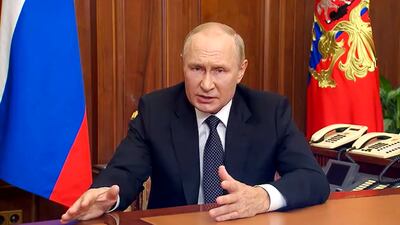A former British Conservative defence minister has suggested Ukraine and its allies should seek to offer Russian President Vladimir Putin something that will “enable him to save face” while also offering him a way out of the conflict.
Andrew Murrison made the comments in the Commons during an MP debate about the situation in Ukraine.
But current Defence Minister James Heappey said the Russian leader does not “deserve any further opportunities for an off-ramp when he has made his decision on what should come next”.
Dr Murrison, the MP for South West Wiltshire, was a defence minister between 2012 and 2014, and more recently served for a little less than a year as a Foreign Office minister until February 2020.
“Unless we’re going to defeat Russia in classical terms — which is unlikely and desirable — there has to be an off-ramp to allow Putin to construct a narrative that will go down well amongst his population and through the media, which he controls,” he told the Commons.
“It’s just not acceptable to say that we cannot offer Putin something out of this that will enable him to save face and therefore get whatever it is through with his population.”
Mr Heappey replied: “I’m not sure I agree with [Dr Murrison] entirely. If Putin was looking for an off-ramp he’s had plenty of opportunities to de-escalate and claim victory at some points along the route.
“In the 48 hours immediately following the mobilisation of Russian society, which is a clear escalation, I’m certainly not — representing His Majesty’s government — going to stand here and say he deserves any further opportunities for an off-ramp when he has made his decision on what should come next.”
Putin's inner circle — in pictures
At another point in the debate, Mr Heappey told MPs that Russia “lacks sufficient manpower in the field to achieve any of its objectives and the mood of Moscow is changing quickly”.
Pressed about Mr Putin’s nuclear threats, Mr Heappey described it as “nuclear sabre-rattling” before noting it is the “act of a desperate man who knows this is not going his way”.
Asked whether the UK believes Mr Putin is bluffing, the minister said: “The government’s exact intelligence assessment is not something to be shared in the House … we believe that it is sabre-rattling and we believe it is designed to try to put a wedge amongst the cohesion of the western alliance and to deter us from supporting Ukraine at the exact moment Ukrainian troops seem to have the upper hand.”
Questioned about Nato’s response if Russia does use one of its weapons, Mr Heappey said: “I’m not going to discuss nuclear doctrine at the despatch box.”
Vladimir Putin says Russia will use 'all means' to defend its territory — video
Speaking later in debate, Conservative former defence secretary Liam Fox warned: “It may be sabre-rattling — but it may be not. We have miscalculated with Putin before. We can’t afford to miscalculate again. He is a tyrant with a tyrant’s behaviour.”
Conservative former prime minister Boris Johnson, in his first contribution to a debate since becoming a backbencher earlier this month, said: “I have no doubt that in the hard winter months ahead with the price of energy continuing to inflict hardship on people in this country and around the world, there will continue to be some who draw the false conclusion that the Ukrainians must be encouraged to do a deal to trade land for peace to allow Russian gas to flow to Europe.
“Even if it were politically possible for Volodymyr Zelenskyy or any Ukrainian government to do such a deal, which I very much doubt, there is absolutely no sign that Putin either wants such a compromise or can be trusted to deliver it.”
Putin: Russia to support referendums in Ukraine's regions — video
After the debate, MPs approved a series of motions for new, strengthened sanctions against Russia.
The sanctions include preventing exports of goods and technology from the defence sector, as well as chemicals, metals and fertilisers, and banning more UK investments and services in Russia.
Foreign Office Minister Jesse Norman told the Commons: “The measures we are debating today are designed to isolate Russia’s economy still further and to target key industries supporting President Putin’s illegal war in Ukraine.”










